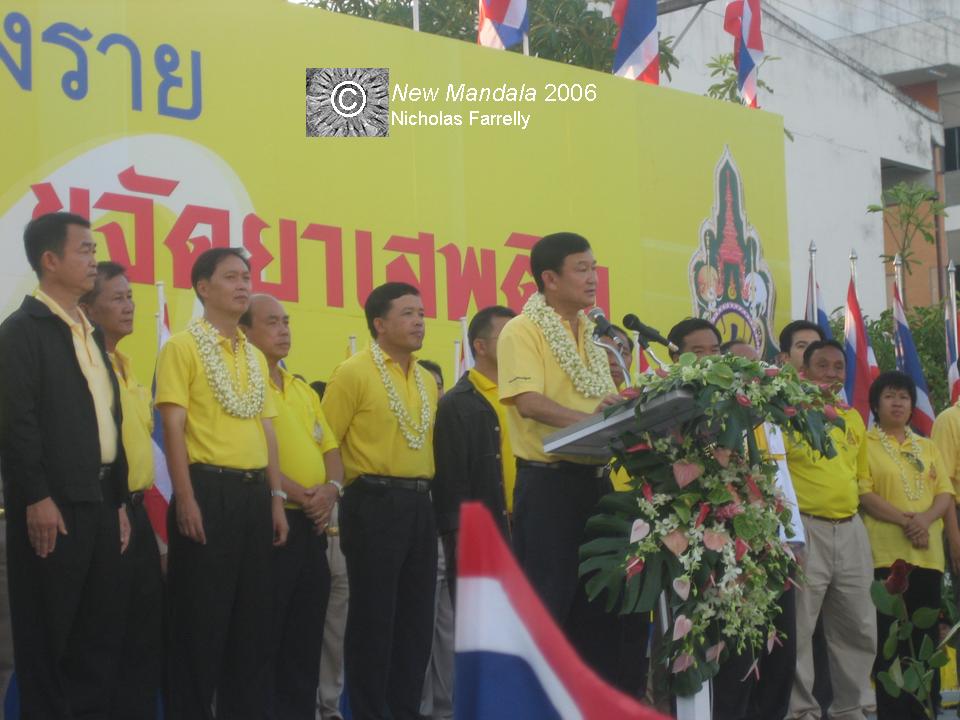Next week Dr Pavin Chachavalpongpun, a regular New Mandala guest contributor, will present a seminar at the ANU where he will discuss the “re-Thaksinization” of Thai politics. All of the details follow below:
Thailand’s 2011 Election: The Re-Thaksinisation of Politics?
Dr Pavin Chachavalpongpun
12.30pm-2.00pm, Tuesday, 27 September 2011
PSC Reading Room, 4.27, Level 4 Hedley Bull Building, ANU
Abstract
Five years ago, on 19 September 2006, the military staged a coup which overthrew the elected government of Thaksin Shinawatra. Tanks rolled on the streets of Bangkok. Some Thais were seen offering flowers to the so-called patriotic soldiers. They accused Thaksin of triggering the worst crisis in the country’s history. But little did they know that the coup that was supposed to kill the “Thaksin disease” was indeed another kind of disease that was to severely demoralise Thai democracy.
The traditional elite thought that they were successful in deracinating Thaksin’s political influence by launching an unlawful coup. But five years on, in 2011, Thaksin’s sister, Yingluck Shinawatra, came to power through the legitimate electoral process. Not only did they fail to eliminate Thaksin, the military and the old establishment together have further intensified the crisis. Violent confrontations have become a feature of Thai politics.
The July election witnessed the homecoming of the Shinawatras. While new Prime Minister Yingluck has been overly careful not to upset her enemies in high places, she is clearly pushing her own political agenda at the behest of her brother. A series of populist programmes ├а la Thaksin have resumed. She has gradually appointed a number of red shirt members in her cabinet. She has also been determined to mend Thailand’s ties with Cambodia, damaged by the Thai nationalists who also declared themselves royalists. Yingluck might be Thaksin’s puppet, but she has played her own game of leadership. The latest polls reveal that Yingluck is more popular than both Prime Ministers Thaksin and Abhisit.
Since the Pheu Thai Party won a landslide election in July 2011, Thailand has witnessed the re-Thaksinisation of politics. Yet, the return of the “Thaksin’s disease” is likely to outrage the traditional elite. Pavin’s talk will focus on a myriad of obstacles for the Yingluck administration which arrive with the re-Thaksinisation of politics, including the renewed attempts of the military to intervene in politics, the politicisation of the monarchy, and the exploitation of lèse-majesté law which has emerged as a weapon to undermine political opponents.
About the Speaker
A former diplomat, Pavin Chachavalpongpun is a Fellow at the Institute of Southeast Asian Studies. He received his PhD from the School of Oriental and African Studies, University of London. Pavin is the author of Reinventing Thailand: Thaksin and His Foreign Policy (2010) and A Plastic Nation: The Curse of Thainess in Thai-Burmese Relations (2005). He is also contributor to a number of journals and book chapters, including Diplomacy Under Siege: Thailand’s Political Crisis and the Impact on Foreign Policy (2009); Temple of Doom: Hysteria about the Preah Vihear Temple in the Thai Nationalist Discourse (2010); Thaksin, the Military and Thailand’s Protratced Political Crisis (2011) and; The Necessity of Enemies in Thailand’s Troubled Politics: The Making of Political Otherness (forthcoming).
 Facebook
Facebook  Twitter
Twitter  Soundcloud
Soundcloud  Youtube
Youtube  Rss
Rss 